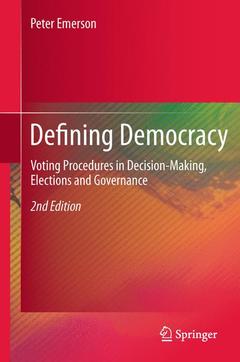Description
Defining Democracy (2nd Ed., 2nd ed. 2012)
Voting Procedures in Decision-Making, Elections and Governance
Author: Emerson Peter
Language: English
Subject for Defining Democracy:
Keywords
Approximative price 105.49 €
In Print (Delivery period: 15 days).
Add to cartPublication date: 03-2014
192 p. · 15.5x23.5 cm · Paperback
Approximative price 105.49 €
In Print (Delivery period: 15 days).
Add to cartPublication date: 12-2011
192 p. · 15.5x23.5 cm · Hardback
Description
/li>Contents
/li>Biography
/li>Comment
/li>
Peter Emerson is the director of the de Borda Institute, an NGO which promotes the use of inclusive voting procedures, especially in conflict zones. The child of a Southern Irish Protestant father and a Northern English Catholic mother, he has been based in Belfast for the last thirty five years. As part of this work, he has travelled extensively, observing several elections for the osce, and his latest deployment was as a translator for the eu Monitoring Mission for South Ossetia. In between such duties, he has lectured in countless universities and other institutes, throughout Europe, in East and Southern Africa, and across the United States. Since 1990 has published extensively on consesus politics in newspapers and books.
Democracy is for everybody, not just a majority - this book explains the basis of a more consensual politics
Advocates more accurate voting methodologies beyond the simplistic majority rule
Shows how democracy is still evolving, e.g. through the use of computer applications
Outlines how consensual voting procedures can play a vital part in any peace process
Includes supplementary material: sn.pub/extras
These books may interest you

The Elections in Israel 2013 160.25 €

The Elections in Israel 2013 45.15 €


